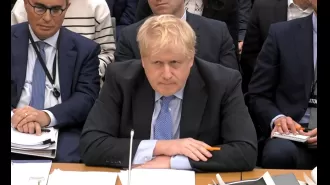Foreign investors withdrew Rs 22,000 crore from the Indian stock market in May due to concerns over upcoming elections and the strong performance of Chinese markets.
Foreign investors have withdrawn Rs 22,000 crore from Indian equities this month due to election uncertainty and strong Chinese markets.
May 26th 2024.

Recently, there has been a significant pull-out of foreign investments from Indian equities, amounting to a whopping Rs 22,000 crore. This sudden move can be attributed to the ongoing uncertainty surrounding the outcome of the Lok Sabha elections, as well as the strong performance of Chinese markets. In fact, just last month, there was a net outflow of over Rs 8,700 crore, primarily due to concerns over changes in India's tax treaty with Mauritius and the steady increase in US bond yields. However, it's worth noting that in March and February, foreign portfolio investors (FPIs) had made a net investment of Rs 35,098 crore and Rs 1,539 crore respectively.
Looking ahead, as the election results become clearer, it is expected that FPIs will start investing in the Indian market once again. After all, they wouldn't want to miss out on the potential post-election results rally. In fact, VK Vijayakumar, Chief Investment Strategist at Geojit Financial Services, believes that the rally may even begin before the election results are announced.
According to data from depositories, there has been a net outflow of Rs 22,047 crore from equities in the current month. Vijayakumar explains that this massive selling was triggered by the strong performance of Chinese stocks, particularly the Hang Seng index, which saw a surge of 7.66% last month. Additionally, the uncertainty surrounding the election may have also played a role in FPIs deciding to sell their investments.
Himanshu Srivastava, Associate Director and Manager Research at Morningstar Investment Research India, points out that with the ongoing election and the ambiguity surrounding its outcome, foreign investors are hesitant to enter the Indian equity market at this time. They would rather wait until the election results are announced before making any decisions.
In recent times, the US Federal Reserve has indicated that it will not be making any rate cuts until inflation cools down and moves closer to the target range. This has raised doubts about the possibility of an early rate cut and has led to the appreciation of the US Dollar, causing a surge in US Treasury yields. Srivastava adds that this situation does not bode well for emerging markets like India, as investors tend to shift from riskier assets to safer ones, such as the US Dollar and US Treasuries.
On the other hand, FPIs have invested Rs 2,009 crore in the debt market during this period. Before the recent outflow, they had put in Rs 13,602 crore in March, Rs 22,419 crore in February, and Rs 19,836 crore in January. This influx was largely driven by the upcoming inclusion of Indian government bonds in the JP Morgan Index. Vipul Bhowar, Director of Listed Investments at Waterfield Advisors, believes that the long-term outlook for FPI flows into Indian debt is positive due to this inclusion in global bond indices. However, the current flows are being influenced by global macroeconomic uncertainty and volatility. Bhowar believes that the trend will reverse once there is more clarity on the interest rate outlook.
JP Morgan Chase & Co. had announced in September last year that it will be adding Indian government bonds to its benchmark emerging market index starting in June 2024. This momentous decision is expected to bring in an influx of around USD 20-40 billion in the next 18 to 24 months. Overall, in 2024 so far, FPIs have withdrawn a net amount of Rs 19,824 crore from equities, but have invested Rs 46,917 crore in the debt market.
Looking ahead, as the election results become clearer, it is expected that FPIs will start investing in the Indian market once again. After all, they wouldn't want to miss out on the potential post-election results rally. In fact, VK Vijayakumar, Chief Investment Strategist at Geojit Financial Services, believes that the rally may even begin before the election results are announced.
According to data from depositories, there has been a net outflow of Rs 22,047 crore from equities in the current month. Vijayakumar explains that this massive selling was triggered by the strong performance of Chinese stocks, particularly the Hang Seng index, which saw a surge of 7.66% last month. Additionally, the uncertainty surrounding the election may have also played a role in FPIs deciding to sell their investments.
Himanshu Srivastava, Associate Director and Manager Research at Morningstar Investment Research India, points out that with the ongoing election and the ambiguity surrounding its outcome, foreign investors are hesitant to enter the Indian equity market at this time. They would rather wait until the election results are announced before making any decisions.
In recent times, the US Federal Reserve has indicated that it will not be making any rate cuts until inflation cools down and moves closer to the target range. This has raised doubts about the possibility of an early rate cut and has led to the appreciation of the US Dollar, causing a surge in US Treasury yields. Srivastava adds that this situation does not bode well for emerging markets like India, as investors tend to shift from riskier assets to safer ones, such as the US Dollar and US Treasuries.
On the other hand, FPIs have invested Rs 2,009 crore in the debt market during this period. Before the recent outflow, they had put in Rs 13,602 crore in March, Rs 22,419 crore in February, and Rs 19,836 crore in January. This influx was largely driven by the upcoming inclusion of Indian government bonds in the JP Morgan Index. Vipul Bhowar, Director of Listed Investments at Waterfield Advisors, believes that the long-term outlook for FPI flows into Indian debt is positive due to this inclusion in global bond indices. However, the current flows are being influenced by global macroeconomic uncertainty and volatility. Bhowar believes that the trend will reverse once there is more clarity on the interest rate outlook.
JP Morgan Chase & Co. had announced in September last year that it will be adding Indian government bonds to its benchmark emerging market index starting in June 2024. This momentous decision is expected to bring in an influx of around USD 20-40 billion in the next 18 to 24 months. Overall, in 2024 so far, FPIs have withdrawn a net amount of Rs 19,824 crore from equities, but have invested Rs 46,917 crore in the debt market.
[This article has been trending online recently and has been generated with AI. Your feed is customized.]
[Generative AI is experimental.]
0
0
Submit Comment





